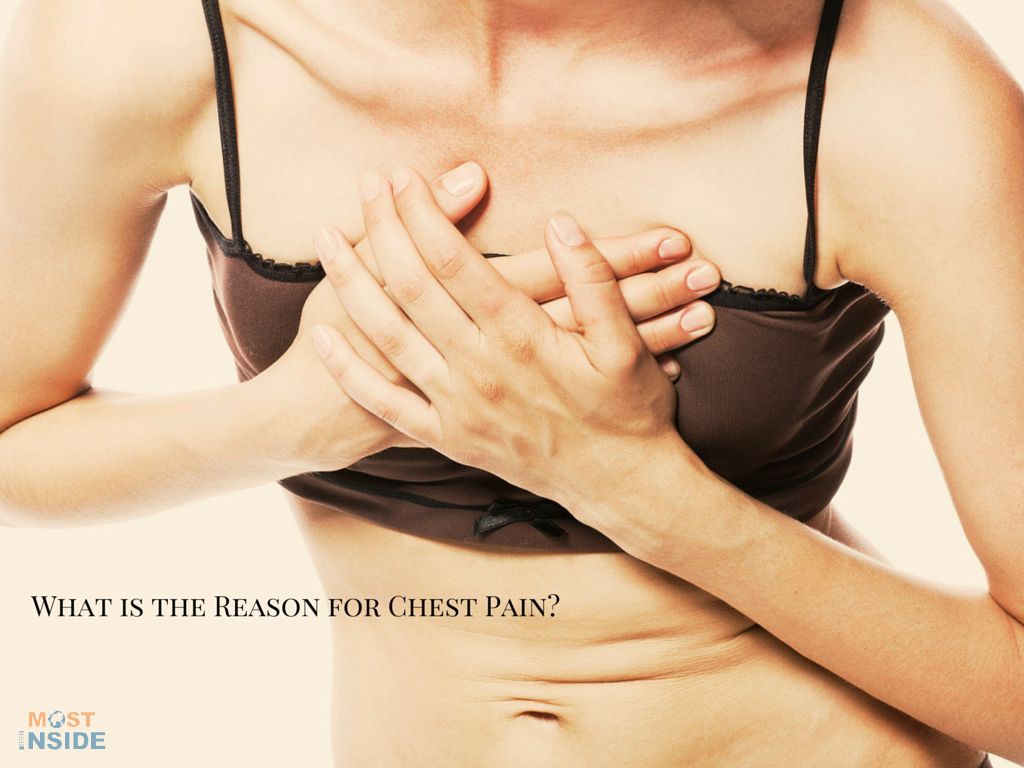What is the Reason for Chest Pain?
This post was last updated on December 9th, 2024

Chest pain can be caused due to multiple reasons and unlike many of us think, heart attack is not always the reason. So what are the other reasons that cause chest pain and how to recognize them?
Chest pain is something, which you should never ignore. It often indicates serious complications in the functioning of the heart or other parts of the body system. But it is also true that chest pain does not always mean that you are going to have a heart attack. There can be other possible causes of the pain. You would be surprised to know that around a quarter of the people in America experience this type of pain that is not related to the heart.
Health experts state that chest pain can also be caused due to problems in esophagus, lungs, ribs, nerves or muscles. Some of these conditions can be a serious threat to your life, whereas some can be treated easily with medication. So, the gist is if you are having an unexplained chest pain, you must not take it lightly, but at the same time you must not dread unnecessary and should first let the health caretaker evaluate you.
Where do you feel the Chest Pain Most?
You can feel the chest pain anywhere in the upper part of the body, especially from the neck to the upper abdomen. The intensity and type of pain you may feel will depend upon the cause. The common symptoms include sharp, burning, dull, stabbing or aching chest pain. In some cases, the patient may feel a tight, crushing or squeezing sensation.
Reasons for Chest Pain
1. Heart Problems
Coronary Artery Disease (CAD): In this type of heart problem, there is a blockage in the blood vessels of the heart due to which the flow of blood and oxygen to the heart muscle is reduced. It leads to chest pain, which is also known as angina. Although it is a type of heart disease, but usually, do not lead to permanent heart damage. However, it does indicate that you can have a heart attack in the future. The patient experiences chest pain that spreads towards the shoulder, arm, jaw, or back. Emotional distress, exercise, excitement, that feels like squeezing sensation or pressure can also trigger angina. Rest is advised for getting relief from these symptoms.
Myocardial Infarction (heart attack): When the blood flow to the heart vessels is reduced it leads to death of the cells of the heart muscle causing chest pain similar to angina. However, in this case, the chances of heart attack are much more and the attack is more severe. The patient experiences crushing pain in the left side or center of the chest that does not go off even after rest. It is usually accompanied by shortness of breath, nausea, sweating or severe weakness.
Myocarditis: This condition causes inflammation of the heart muscle, leading to chest pain and other symptoms such as fast heartbeat, fatigue, fever, and trouble in breathing. Even though there are no blockages associated with this condition, the symptoms are almost similar to heart attack.
Pericarditis: Inflammation of the sac around the heart causes Pericarditis. It causes chest pain similar to angina and the pain is steady and sharp moving along the shoulder muscle and the upper neck. It can get worse when you lie on the back, swallow food or breathe. Pericarditis is a genetic disease that causes abnormally thick growth of the heart muscle. In this condition, the chest pain is triggered off by exercise.
Mitral Valve Prolapse: In this particular type of condition, one of the valves in the heart do not close properly, causing chest pain and other symptoms such as dizziness, lightheadedness and palpitations.
Coronary Artery Dissection: A rare and deadly condition, it can be caused due to multiple factors. The symptoms are caused when a tear develops in the coronary artery causing sudden, excruciating pain starting from the chest. The pain comes with a ripping or tearing sensation and goes up to the back, abdomen and neck.
2. Lung Problems
Lung problems can also cause different types of chest pain. The most common causes are:
Pleuritis: The condition is also known as pleurisy and causes irritation or inflammation of the lining of the chest and lungs. When you suffer from pleurisy, you experience a sharp pain when you cough, breathe or sneeze. The pleuritic chest pain is commonly caused due to viral or bacterial infections, pneumothorax and pulmonary embolism. Less known causes include cancer, lupus and rheumatoid arthritis.
Lung Abscess or Pneumonia: These types of lung infections can lead to chest pain such as the ache in the deep chest. Fever, cough, chills and pus coming out of the respiratory tract can accompany the chest pain. Acute pleuritis is caused when a blood clot travels via the bloodstream and places itself in the lungs, leading to rapid heartbeat and trouble breathing.
Pneumothorax: It is a condition caused due to collapse of lungs, more often due to injury to the chest. It causes chest pain that keeps on getting worse when you breathe and other symptoms such as low blood pressure.
Pulmonary Hypertension: The chest pain caused due to this condition resembles angina pain accompanied by abnormally high blood pressure in the arteries of the lung. It instigates the heart’s right side to work hard.
Asthma: Wheezing, coughing, shortness of breath and chest pain is the symptoms of this inflammatory disorder of the airways.
Recommended: 11 Important Check Marks To Know If You Are Emotionally Healthy
3. Gastrointestinal Problems
Chest pain induced by gastrointestinal problems includes:
Gastroesophageal reflux disease (GERD): It is also known as acid reflux and occurs when the content in the stomach moves back into the throat. It leads to sour taste in the mouth, burning sensation in the throat and chest also known as chest burn or heartburn. Factors that cause this type of chest pain include smoking, pregnancy, obesity or fatty/spicy foods. The chest pain and heartburn feel almost similar because the esophagus and the heart are located closely and have a common nerve network.
Esophageal Contraction Disorders: High-pressure contractions (nutcracker esophagus) and uncoordinated muscle contractions (spasms) in the esophagus also cause chest pain.
Esophageal Hypersensitivity: Sometimes the esophagus becomes sensitive to even the smallest change in the pressure or when exposed to acid causing chest pain.
Esophageal Perforation or Rupture: A severe, sudden pain in the chest followed by vomiting can be caused due to esophageal rupture or perforation.
Peptic Ulcers: These are the painful sores formed inside the abdominal lining or even the first part of the small intestine. It causes a vague and recurring discomfort in the chest. This condition is more common in people who drink or smoke excessively or take painkillers or NSAID’s on a regular basis.
Hiatal hernia: In this condition, the top of the stomach moves inside the lower chest after eating. This leads to reflux symptoms such as chest pain and heartburn. The pain worsens as you lie down.
Pancreatitis: If you are having pain in the lower chest, chances are that you may be suffering from pancreatitis that becomes worse when you lean forward or lie flat.
Gallbladder Problem: If after having a fatty meal, you feel pain or a sensation of fullness in the lower right chest area of the upper right abdomen, it can be due to a gallbladder problem.
4. Bones, Nerves and Muscles
Overuse or Injury: Many times chest pain occurs due to an injury to the chest area or overuse of the chest muscles. Sometimes virus can also trigger off the chest pain.
Rib Problems: A rib fracture can cause chest pain, which worsens with coughing or deep breathing. The pain is restricted to one area.
Muscle Strain: The chest pain can be caused due to muscle strain and can worsen with hard coughing. The muscle strain occurs due to hard coughing that injures or inflames the tendons and the muscles in between the ribs causing chest pain.
Shingles: It is caused by the varicella zoster virus, and prompts a band-like sharp pain followed by telltale rashes.
Other causes of chest pain include panic attacks and anxiety.
Thus, you can suffer from chest pain due to various health problems and hence, it is best to consult your caregiver whenever you have a pain in the chest.
You may like this
Recommended For You
The Ultimate Gaming Chair and Why It’s Good for Your Back
Sangati Jogwar
Sangati is a writer, poet, voracious book reader, singer, movie-buff and critic. Loves to discuss, interact and have a strong belief in spirituality.




